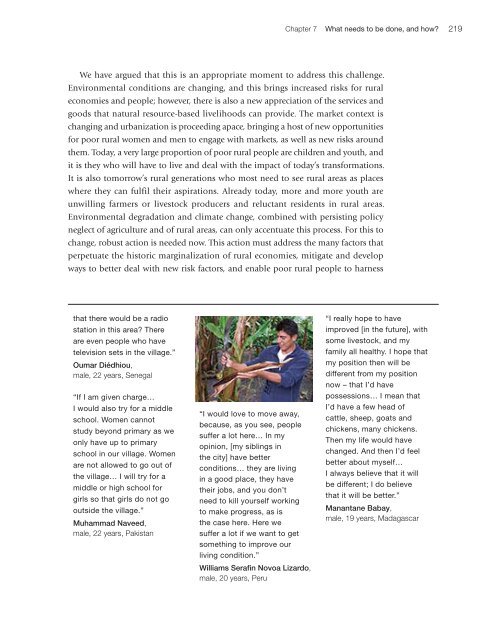English - IFAD
English - IFAD
English - IFAD
Create successful ePaper yourself
Turn your PDF publications into a flip-book with our unique Google optimized e-Paper software.
Chapter 7 What needs to be done, and how? 219<br />
We have argued that this is an appropriate moment to address this challenge.<br />
Environmental conditions are changing, and this brings increased risks for rural<br />
economies and people; however, there is also a new appreciation of the services and<br />
goods that natural resource-based livelihoods can provide. The market context is<br />
changing and urbanization is proceeding apace, bringing a host of new opportunities<br />
for poor rural women and men to engage with markets, as well as new risks around<br />
them. Today, a very large proportion of poor rural people are children and youth, and<br />
it is they who will have to live and deal with the impact of today’s transformations.<br />
It is also tomorrow’s rural generations who most need to see rural areas as places<br />
where they can fulfil their aspirations. Already today, more and more youth are<br />
unwilling farmers or livestock producers and reluctant residents in rural areas.<br />
Environmental degradation and climate change, combined with persisting policy<br />
neglect of agriculture and of rural areas, can only accentuate this process. For this to<br />
change, robust action is needed now. This action must address the many factors that<br />
perpetuate the historic marginalization of rural economies, mitigate and develop<br />
ways to better deal with new risk factors, and enable poor rural people to harness<br />
that there would be a radio<br />
station in this area? There<br />
are even people who have<br />
television sets in the village.”<br />
Oumar Diédhiou,<br />
male, 22 years, Senegal<br />
“If I am given charge…<br />
I would also try for a middle<br />
school. Women cannot<br />
study beyond primary as we<br />
only have up to primary<br />
school in our village. Women<br />
are not allowed to go out of<br />
the village… I will try for a<br />
middle or high school for<br />
girls so that girls do not go<br />
outside the village.”<br />
Muhammad Naveed,<br />
male, 22 years, Pakistan<br />
“I would love to move away,<br />
because, as you see, people<br />
suffer a lot here… In my<br />
opinion, [my siblings in<br />
the city] have better<br />
conditions… they are living<br />
in a good place, they have<br />
their jobs, and you don’t<br />
need to kill yourself working<br />
to make progress, as is<br />
the case here. Here we<br />
suffer a lot if we want to get<br />
something to improve our<br />
living condition.”<br />
Williams Serafin Novoa Lizardo,<br />
male, 20 years, Peru<br />
“I really hope to have<br />
improved [in the future], with<br />
some livestock, and my<br />
family all healthy. I hope that<br />
my position then will be<br />
different from my position<br />
now – that I’d have<br />
possessions… I mean that<br />
I’d have a few head of<br />
cattle, sheep, goats and<br />
chickens, many chickens.<br />
Then my life would have<br />
changed. And then I’d feel<br />
better about myself…<br />
I always believe that it will<br />
be different; I do believe<br />
that it will be better.”<br />
Manantane Babay,<br />
male, 19 years, Madagascar

















